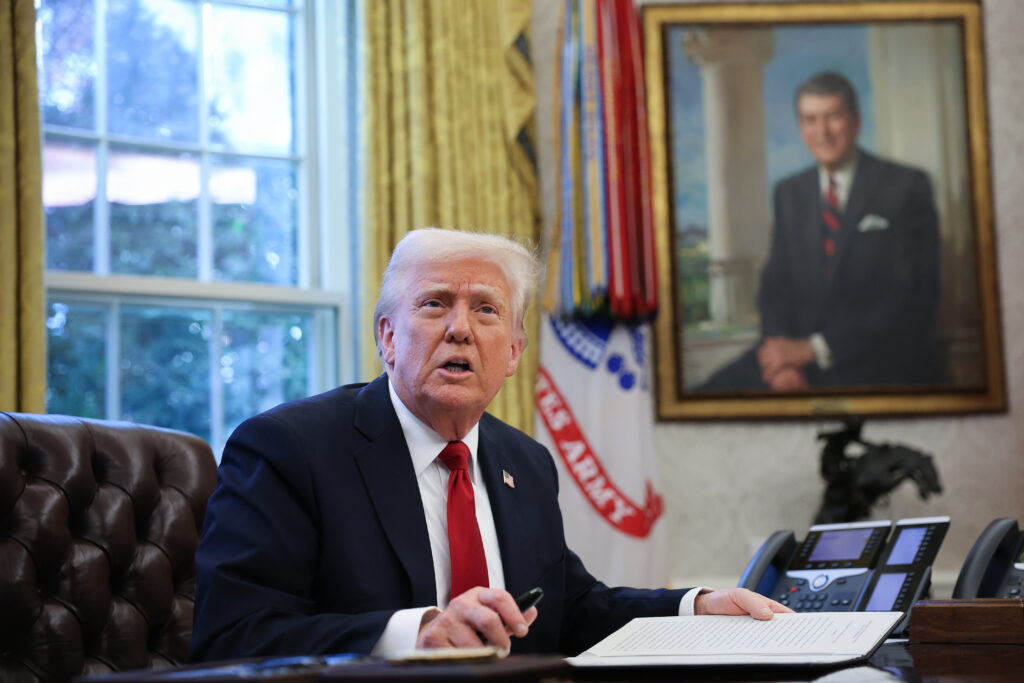At Briefing, White House Urges States to Use DHS Databases to Check Citizenship for Voting

The White House briefed state election officials on a revamped citizenship verification system Tuesday, selling them on an untested solution for a nearly nonexistent problem.
Attended by a bipartisan group of more than a dozen secretaries of state and other election administrators, the briefing was led by U.S. Citizenship and Immigration Services (CIS) Director Joseph Edlow and officials from the White House’s Office of Intergovernmental Affairs and Domestic Policy Counsel.
The presentation followed a similar one held last month, revealed exclusively by Democracy Docket, for members of the Election Integrity Network, which works for more restrictive voting rules and was founded by the prominent anti-voting lawyer Cleta Mitchell.
CIS’s Systemic Alien Verification for Entitlements (SAVE) program uses various federal databases to flag whether someone is a non-citizen. The original purpose was to check eligibility for federal benefits programs through one-by-one queries. But in response to the executive order on voting President Donald Trump issued in March, CIS upgraded the system, integrating data from the Social Security Administration and making it available for free to state election officials to confirm voter registrants’ citizenship en masse.
Even before the briefing, some Republican election officials had already started using the untested, expanded verification program to remove possible non-citizens from voter rolls — Texas Sec. of State Jane Nelson credited SAVE in June when she announced 33 potential non-citizen voting cases for prosecution.
According to CIS records, twenty states, as well as a few dozen local election offices, are currently registered to use the SAVE program for voter roll maintenance..
Voting-rights groups and Democratic officials have also questioned whether the expanded SAVE program properly complies with federal data laws like the Privacy Act, which generally requires federal agencies to provide public notice before using personal data in new ways.
Some Republican attendees, like Kansas Sec. of State Scott Schwab and Indiana Sec. of State Diego Morales, took to social media to praise Trump for the SAVE overhaul.
“President Trump is giving Indiana the tools and resources to have free, fair, safe and secure elections,” Morales said in a video on X.
But others at the briefing, from both sides of the aisle, were more circumspect, attendees said.
Connecticut Sec. of State Stephanie Thomas (D) said she attended the briefing out of professional curiosity.
“Here in Connecticut, our state law would preclude us from using it,” Thomas said. “We are not allowed to send any [personally identifiable information] to federal agencies. So, in a way, I don’t have to think about it… [but] I have concerns.”
“They framed the problem in our voter rolls as non-citizen voters and dead voters,” Thomas said. “But I reject that that’s the issue that needs solving in elections, when case after case has already proven, beyond a doubt, that these are more edge cases than the prevalent issues of the day.”
Thomas said she raised a few questions at the meeting, asking CIS and White House officials who would have access to the state-supplied data in the requests, and whether the results would be subject to the Freedom of Information Act. They said they’d have to research answers and get back to her, Thomas said.
Another Democratic attendee, Vermont Sec. of State Sarah Copeland Hanzas, similarly left the briefing with concerns over the discrepancies in what White House officials said about the information transmitted to and from the SAVE system and what’s written in the Memorandum of Understanding (MOU) signed by offices registered with the program.
“They said verbally to us that the report would come back to us and it would be ours to take the appropriate next steps,” Copeland Hanzas said. “But the MOU very clearly says that they can use this data to follow up any concerns about possible violation of federal law.”
The officials described how one state with around 1 million voters recently used SAVE to find 30 registered people with non-verified citizenship, Copeland Hanzas said.
But, she added, administration officials said that the state then “found that all but two were actually citizens and eligible to vote, and that… the two [non-citizens] had never cast a ballot.”
That left Copeland Hanzas concerned with how the names generated by state-initiated SAVE reports might be used by other federal agencies. “Will there be repercussions for those people because they appear on this list?” she asked.
While CIS officials said they were working hard to improve data quality and prevent false non-citizen positives with a September 1 deadline in mind, they were unable to guarantee that newly-naturalized citizens would be properly identified, Copeland Hanzas said.
“This is a huge concern for me, because I go to every naturalization ceremony that happens in Vermont,” she said. “And if I’m registering people to vote, and then a month or two later, they’re getting a knock on their door because they appeared on a false list, or worse yet, that list gets shared with Immigrations and Customs Enforcement, and that’s who knocks on their door? That’s not okay.”
Thomas described the meeting as cordial and cooperative, but added that she would have preferred if the White House offered help on the “problems we have in Connecticut.” For her, more coordination between the states — like with the ERIC program that conservative election officials have pulled out of in recent years — and more money for voter education efforts would do way more to keep voter rolls up-to-date than DHS data.
“The lack of funding in elections overall is, I think, penny wise and pound foolish,” she said.